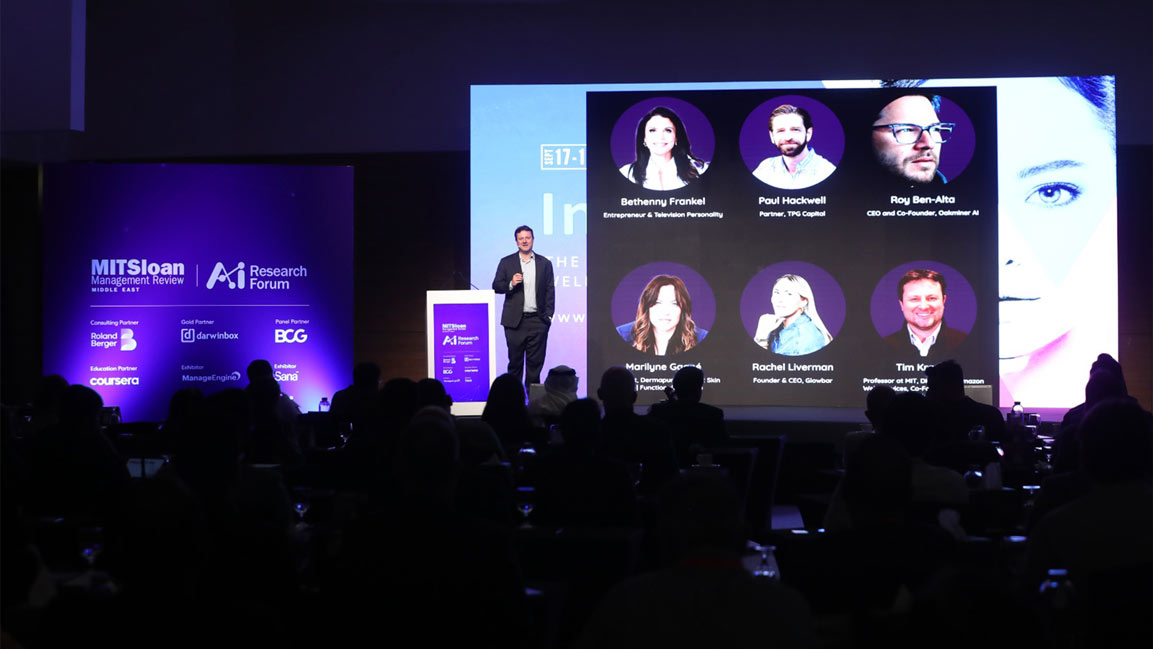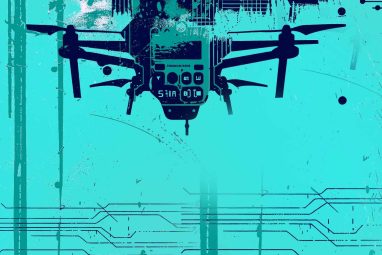AI Research Forum 2025 Wrap-Up: Rethinking Leadership in the Age of Agentic AI
At AIRF, hosted by MIT SMR Middle East, the discussions spotlighted an agentic future: AI gaining agency and the imperative for business leaders to meet it with foresight, flexibility, and ethics.
News
- Meta’s AI Strategy Signals a New Reality: Compute Is the Competitive Moat
- Anthropic Pushes Back on Pentagon Pressure to Loosen AI Use Restrictions
- Amazon’s $50B OpenAI Investment Tied to AGI Milestone or IPO: Report
- Perplexity Unveils AI System Built to Run Entire Workflows
- Salesforce CEO Dismisses SaaSpocalypse Fears
- UAE PropTech Startup Rewa Reimagines Rent as a Rewards Economy

Tim Kraska Associate Professor of Electrical Engineering and Computer Science, Massachusetts Institute of Technology, Credit- AI Research Forum 2025
As autonomous AI transitions from experimental promise to operational reality, a critical question emerges: How should leadership evolve when AI is no longer just a tool, but a teammate? This was the central dilemma driving the AI Research Forum 2025, hosted by MIT Sloan Management Review Middle East at JW Marriott Hotel Marina in Dubai on September 23.
The event convened AI researchers, corporate leaders, and digital transformation executives to explore the shifting frontiers of decision-making, work design, and strategy in a world where agentic AI—systems capable of autonomous, goal-directed behavior—are becoming central to organizational performance.
Redefining Leadership for the Age of Autonomy
In the inaugural panel discussion, experts from education, consulting, and academia examined how agentic AI is challenging traditional leadership models and governance structures.
Geoffrey Alphonso (CEO, Alef Education), Kaustubh Wagle (MD & Partner, BCG), and MIT Professor Tim Kraska explored how managing hybrid human-AI teams requires more than technical fluency. It demands new forms of ethical oversight, trust-building, and decision-rights allocation.
Having used AI in the education landscape, Alphonso said, “It’s really about asking the right questions and framing the right questions. I think we need to remove the bias of just consuming what AI tells us and have that human intersection to assess and analyze. And I think that intersection is very important when it comes to leadership.”
“We have humans and AI agents working together. It’s no longer about driving efficiency from humans and the workflows,” Wagle weighed in.
When asked how organizations can ensure that people and AI work effectively together, Kraska pointed out three essentials: transparency, literacy, and psychological safety. “If any one of these three fails, trust fails,” he noted.
The discussion underscored that as AI agents take on operational roles, leaders must be prepared to frame new accountability structures and ensure systems reflect organizational values, not just technical goals.
Parsing the Hype from Reality in Agentic AI
In his keynote, Tim Kraska, Associate Professor at MIT, offered a candid assessment of where autonomous AI is delivering value and where it still falls short. He examined the current state of autonomous AI, the evolving role of human oversight in automated workflows, and the imperative for robust governance and ethical frameworks to balance opportunity with risk.
Kraska highlighted where AI is already generating real success, where the technology continues to underdeliver, and what these gaps reveal about the challenges that lie ahead. He focussed on AI agents in data-driven decision making and software development — two domains where the opportunities are substantial but the constraints remain equally visible.
Architecting Real-World Agentic AI Systems
Anirudh Narayan, Co-Founder of Lyzr, led a technical deep dive into the real-world deployment of agentic systems. The session explored how to build scalable AI infrastructures, with particular attention to data ingestion, model deployment pipelines, and fault-tolerant system design.
“Three primary things that everyone’s worried about are hallucinations, data privacy, and explainability,” he shared.
Pulling from Narayan’s breakdown of agentic AI deployment across sectors in the Middle East, a multi-industry panel on human-AI synergy brought together senior leaders from ADNOC, the London Stock Exchange Group, NEOM, and Roland Berger. Awad Ahmed Ali El-Sidiq, Srimanth Rudraraju, Paul Potgieter, and Nizar Hneini shared case studies on designing workflows where AI agents take initiative, yet humans retain contextual authority.
The discussion centered on how autonomous agents are altering team dynamics, elevating the need for complementarity between human insight and machine precision. When asked what true collaboration between an AI agent and a human in a team looks like today, a panelist summed it up, “Today, the potential is vast. But the reality is, we need to figure out what the system integration will look like.”
The Future of Work in an AI-First World
In a fireside session, Rahul Lakhanpal, VP of Product Marketing at DarwinBox, reflected on how agentic AI will redefine roles, recruitment, and upskilling. He emphasized the importance of AI-literate leadership and organizational agility as critical success factors for the workforce of the future.
“Agentic AI is going to help you consume information better, as it clears out the noise and presents only the most critical average information and comes to you versus you chasing that information,” he said.
Demonstrating a real-life example of an agentic AI conducting a screening test with a product manager, Lakhanpal shared, “The agent helps the recruiter move forward in the hiring process. It doesn’t screen the candidates on its own; it checks with you on what’s important to you as an organization, from a culture standpoint, from a candidate standpoint.”
This automated process helps recruiters save time to redirect efforts on other tasks.
When AI Must Yield to Human Judgment
To close the forum, Dylan Hadfield-Menell, Assistant Professor at MIT CSAIL, delivered a powerful session on AI’s limits. From ambiguous moral decisions to contexts requiring empathy or discretion, he argued that there will always be spaces where human judgment must prevail.
“Once you’ve laid down a menu of options of what the system can do, tell it what you want it to do. And that can be done by a reward function. So, in the case of getting the robot to pick up a ball, we might say that there’s a reward of one for picking up the ball and a reward of zero for all other states,” he said.
His key message: agentic AI must be complementary, not competitive—and building safe, useful systems means knowing exactly where those boundaries lie.
A Blueprint for Leadership in the Age of AI Agents
The event crystallized a vision of the future that is neither utopian nor dystopian, it is agentic: dynamic, data-driven, and decisively human-aligned. Across keynotes and panels, one theme remained clear: as AI gains agency, leaders must gain foresight, flexibility, and ethical fluency.








